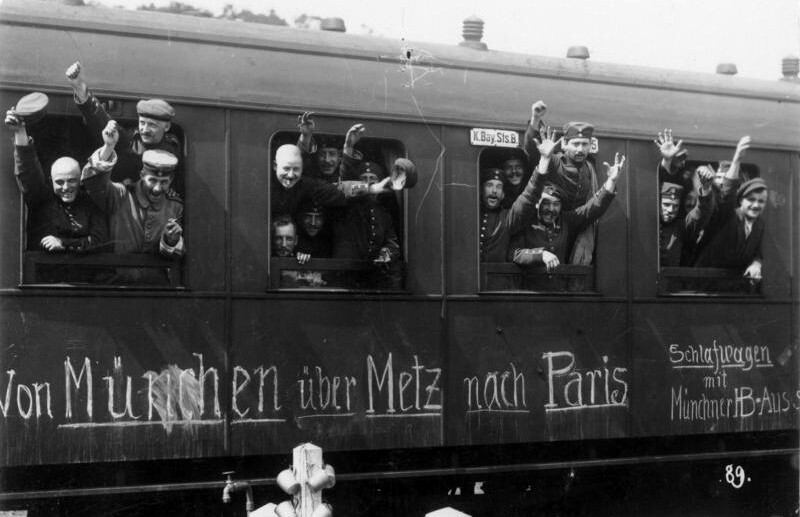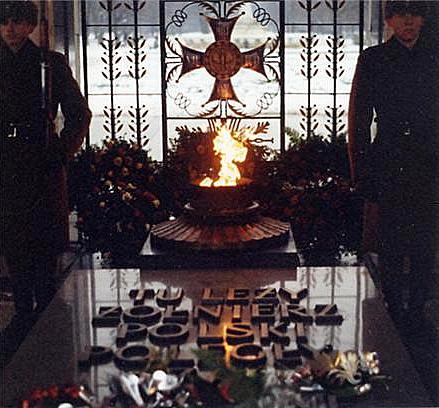|
Battle Of Mołotków
The Battle of Mołotków (Polish: Bitwa pod Mołotkowem) took place on October 29, 1914, near the village of Mołotków ( Molotkiv), Austrian Galicia (current Ukraine). 2nd and 3rd Infantry Regiments of Polish Legions clashed with units of the Russian Imperial Army, which had invaded Galicia (see Russian occupation of Eastern Galicia, 1914–15). Polish forces were part of Tactical Group of General Karol Durski-Trzaska. On October 29, the Group of Durski-Trzaska attacked Russian positions in the outskirts of Mołotków. Polish 4th Battalion commanded by Bolesław Roja managed to reach the center of the village, but was then stopped and forced to retreat. Meanwhile, the bulk of both 2nd and 3rd Regiments, with some 6000 soldiers, fiercely resisted 12 battalions of Russian infantry (15 000) soldiers, supported by 24 machine guns and 16 cannons. The Russians broke through Polish positions, forcing both regiments to retreat, in order to avoid encirclement. Polish losses amounted ... [...More Info...] [...Related Items...] OR: [Wikipedia] [Google] [Baidu] |
Ukraine
Ukraine ( uk, Україна, Ukraïna, ) is a country in Eastern Europe. It is the second-largest European country after Russia, which it borders to the east and northeast. Ukraine covers approximately . Prior to the ongoing Russian invasion, it was the eighth-most populous country in Europe, with a population of around 41 million people. It is also bordered by Belarus to the north; by Poland, Slovakia, and Hungary to the west; and by Romania and Moldova to the southwest; with a coastline along the Black Sea and the Sea of Azov to the south and southeast. Kyiv is the nation's capital and largest city. Ukraine's state language is Ukrainian; Russian is also widely spoken, especially in the east and south. During the Middle Ages, Ukraine was the site of early Slavic expansion and the area later became a key centre of East Slavic culture under the state of Kievan Rus', which emerged in the 9th century. The state eventually disintegrated into rival regional po ... [...More Info...] [...Related Items...] OR: [Wikipedia] [Google] [Baidu] |
1914 In Ukraine
This year saw the beginning of what became known as World War I, after Archduke Franz Ferdinand of Austria, heir to the Austrian throne was Assassination of Archduke Franz Ferdinand, assassinated by Serbian nationalist Gavrilo Princip. It also saw the first airline to provide scheduled regular commercial passenger services with heavier-than-air aircraft, with the St. Petersburg–Tampa Airboat Line. Events January * January 1 – The St. Petersburg–Tampa Airboat Line in the United States starts services between St. Petersburg, Florida, St. Petersburg and Tampa, Florida, becoming the first airline to provide scheduled regular commercial passenger services with heavier-than-air aircraft, with Tony Jannus (the first federally-licensed pilot) conveying passengers in a Benoist XIV flying boat. Abram C. Pheil, mayor of St. Petersburg, is the first airline passenger, and over 3,000 people witness the first departure. * January 11 – The Sakurajima volcano in Japan b ... [...More Info...] [...Related Items...] OR: [Wikipedia] [Google] [Baidu] |
1914 In Austria-Hungary
This year saw the beginning of what became known as World War I, after Archduke Franz Ferdinand of Austria, heir to the Austrian throne was assassinated by Serbian nationalist Gavrilo Princip. It also saw the first airline to provide scheduled regular commercial passenger services with heavier-than-air aircraft, with the St. Petersburg–Tampa Airboat Line. Events January * January 1 – The St. Petersburg–Tampa Airboat Line in the United States starts services between St. Petersburg and Tampa, Florida, becoming the first airline to provide scheduled regular commercial passenger services with heavier-than-air aircraft, with Tony Jannus (the first federally-licensed pilot) conveying passengers in a Benoist XIV flying boat. Abram C. Pheil, mayor of St. Petersburg, is the first airline passenger, and over 3,000 people witness the first departure. * January 11 – The Sakurajima volcano in Japan begins to erupt, becoming effusive after a very large earthquake ... [...More Info...] [...Related Items...] OR: [Wikipedia] [Google] [Baidu] |
Conflicts In 1914
Conflict may refer to: Arts, entertainment, and media Films * ''Conflict'' (1921 film), an American silent film directed by Stuart Paton * ''Conflict'' (1936 film), an American boxing film starring John Wayne * ''Conflict'' (1937 film), a Swedish drama film directed by Per-Axel Branner * ''Conflict'' (1938 film), a French drama film directed by Léonide Moguy * ''Conflict'' (1945 film), an American suspense film starring Humphrey Bogart * ''Catholics: A Fable'' (1973 film), or ''The Conflict'', a film starring Martin Sheen * ''Judith'' (1966 film) or ''Conflict'', a film starring Sophia Loren * ''Samar'' (1999 film) or ''Conflict'', a 1999 Indian film by Shyam Benegal Games * ''Conflict'' (series), a 2002–2008 series of war games for the PS2, Xbox, and PC * ''Conflict'' (video game), a 1989 Nintendo Entertainment System war game * '' Conflict: Middle East Political Simulator'', a 1990 strategy computer game Literature and periodicals * ''Conflict'' (novel) ... [...More Info...] [...Related Items...] OR: [Wikipedia] [Google] [Baidu] |
Battles Involving Russia
A battle is an occurrence of combat in warfare between opposing military units of any number or size. A war usually consists of multiple battles. In general, a battle is a military engagement that is well defined in duration, area, and force commitment. An engagement with only limited commitment between the forces and without decisive results is sometimes called a skirmish. The word "battle" can also be used infrequently to refer to an entire operational campaign, although this usage greatly diverges from its conventional or customary meaning. Generally, the word "battle" is used for such campaigns if referring to a protracted combat encounter in which either one or both of the combatants had the same methods, resources, and strategic objectives throughout the encounter. Some prominent examples of this would be the Battle of the Atlantic, Battle of Britain, and Battle of Stalingrad, all in World War II. Wars and military campaigns are guided by military strategy, whereas bat ... [...More Info...] [...Related Items...] OR: [Wikipedia] [Google] [Baidu] |
Battles Involving Poland
A battle is an occurrence of combat in warfare between opposing military units of any number or size. A war usually consists of multiple battles. In general, a battle is a military engagement that is well defined in duration, area, and force commitment. An engagement with only limited commitment between the forces and without decisive results is sometimes called a skirmish. The word "battle" can also be used infrequently to refer to an entire operational campaign, although this usage greatly diverges from its conventional or customary meaning. Generally, the word "battle" is used for such campaigns if referring to a protracted combat encounter in which either one or both of the combatants had the same methods, resources, and strategic objectives throughout the encounter. Some prominent examples of this would be the Battle of the Atlantic, Battle of Britain, and Battle of Stalingrad, all in World War II. Wars and military campaigns are guided by military strategy, whereas bat ... [...More Info...] [...Related Items...] OR: [Wikipedia] [Google] [Baidu] |
Battles Of World War I
List of military engagements of World War I encompasses land, naval, and air engagements as well as campaigns, operations, defensive lines and sieges. Campaigns generally refer to broader strategic operations conducted over a large bit of territory and over a long period of time. Battles generally refer to short periods of intense combat localised to a specific area and over a specific period of time. However, use of the terms in naming such events is not consistent. For example, the First Battle of the Atlantic was more or less an entire theatre of war, and the so-called battle lasted for the duration of the entire war. Western Front The Western Front comprised the fractious borders between France, Germany, and the neighboring countries. It was infamous for the nature of the fight that developed there; after almost a full year of inconclusive fighting, the front had become a giant trench line stretching from one end of Europe to the other.Cowley and Parker (editors), pp. 521–5 ... [...More Info...] [...Related Items...] OR: [Wikipedia] [Google] [Baidu] |
Communism
Communism (from Latin la, communis, lit=common, universal, label=none) is a far-left sociopolitical, philosophical, and economic ideology and current within the socialist movement whose goal is the establishment of a communist society, a socioeconomic order centered around common ownership of the means of production, distribution, and exchange which allocates products to everyone in the society.: "One widespread distinction was that socialism socialised production only while communism socialised production and consumption." Communist society also involves the absence of private property, social classes, money, and the state. Communists often seek a voluntary state of self-governance, but disagree on the means to this end. This reflects a distinction between a more libertarian approach of communization, revolutionary spontaneity, and workers' self-management, and a more vanguardist or communist party-driven approach through the development of a constitutional socialist st ... [...More Info...] [...Related Items...] OR: [Wikipedia] [Google] [Baidu] |
Tomb Of The Unknown Soldier (Warsaw)
The Tomb of the Unknown Soldier ( pl, Grób Nieznanego Żołnierza) is a monument in Warsaw, Poland, dedicated to the unknown soldiers who have given their lives for Poland. It is one of many such national tombs of unknowns that were erected after World War I, and the most important such monument in Poland. The monument, located at Piłsudski Square, is the only surviving part of the Saxon Palace that occupied the spot until World War II. Since 2 November 1925 the tomb houses the unidentified body of a young soldier who fell during the Defence of Lwów. Since then, earth from numerous battlefields where Polish soldiers have fought has been added to the urns housed in the surviving pillars of the Saxon Palace. The Tomb is constantly lit by an eternal flame and assisted by a guard post provided by the three companies of the 1st Guards Battalion, Representative Honor Guard Regiment of the Polish Armed Forces. It is there that most official military commemorations take place in P ... [...More Info...] [...Related Items...] OR: [Wikipedia] [Google] [Baidu] |
Walki II Brygady Legionów Polskich W Karpatach, Transport Rannych Walki may refer to: Places * Walki, Belgaum, Karnataka, India; a village * Walki, Ahmednagar, Maharashtra, India; a village * Wałki, Jodłówka-Wałki, Tarnow, Tarnow, Lesser Poland, Poland; a district * Walki, Tuge, Musawa, Katsina, Nigeria; a village, see List of villages in Katsina State Other uses * Walki language, an Australian Aboriginal language See also * Walkis Magic Academy, a fictional location in the Japanese comic manga ''Mashle'' * Konfrontacja Sztuk Walki (KSW), a Polish martial art * * Walkey * Walk (other) A walk is walking, the main form for animal locomotion on land, distinguished from running and crawling. Walk or WALK may refer to: Places *Walk, Livonia, the German name for a town in Livonia *Island Walk, an unincorporated area and a census-des ... * Walke (other) * Walkie (other) {{Dab ... [...More Info...] [...Related Items...] OR: [Wikipedia] [Google] |




